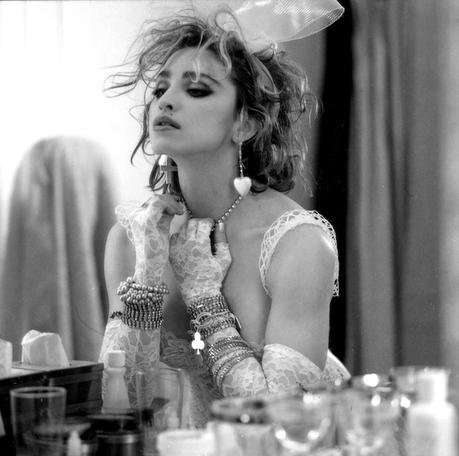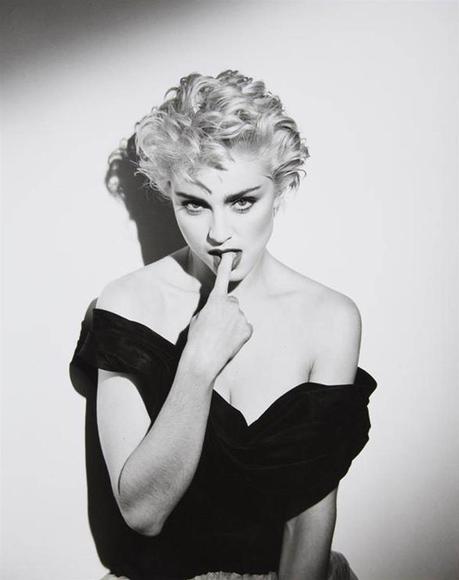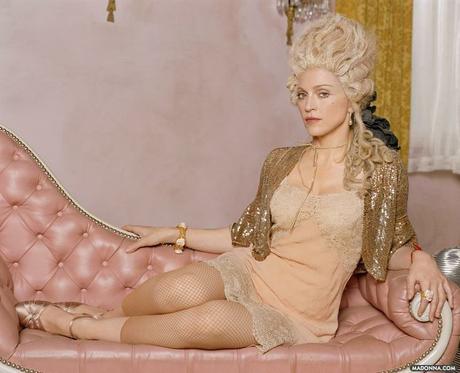Let's start by dealing with some facts: Madonna transcends humanity. She is not only one of the most famous and successful entertainers ever to have existed on the planet, she is also a role model, a provider of mantras, a beacon of hope, a hill to die on, a cross to both bear and burn. Few celebrities have managed to gather so much acclaim and ire as she has, which supports the idea that Madonna is almost too much to deal with. She has lived through and played the role of almost every stage of celebrity - ascending, falling, regrouping, ascending again - and never hidden away.

It's perhaps a hangover from her ballsy entry into the celebrity sphere that she is thought of as cold and calculated, despite much proof of the contrary. Her shtick was that she was uncompromising, ambitious, and frank, and she proved again and again she was a force to be reckoned with. One of few performers to understand the importance of image and costume and their part in making you an icon, Madonna's keenness to switch her look and use her one body as a canvas has been dismissed just as heavily as it was lauded. Other stars may have been congratulated for their chameleon-like expertise and savvy manipulation of society's expectations, but Madonna is Madonna, whose knack for self-promotion and speaking out was seen as a disease rather than a lucky charm. Comparing Madonna's progress through fame and fortune to her peers is pointless, however - even those contemporaries and icons born the same year as her, like Prince, Michael Jackson, and Kate Bush - because while those artists are all true one-offs, they are not like Madonna. Nobody ever is. Even Madonna isn't sometimes.
Provocation has always been Madonna's currency, and throughout her career she has sure had those tills ringing. Sexuality has been her most common gateway into getting a reaction, be it rolling around the floor singing about virgins or releasing a coffee-table book of graphic images. From early on in her career, she has been accused of being obsessed with sex, and seen as slutty, or wanton, or a nymphomaniac - but the pursuit of sex has never been on Madonna's radar. Madonna didn't need to take her clothes off on stage to get a man, and her career was not just a high-octane version of swiping on a dating app. Madonna's focus on sexuality was because she thought there was something missing, that people weren't having conversations, that either they were repressed or benefiting from the repression of others. Women weren't supposed to behave like Madonna did, but most of Madonna's early career could be summed up in two words: "Says who?"
Madonna took on misogyny, religion, sexism, homophobia and questioned all our norms. Through her music, and imagery, she toyed with her audience's insecurities. Those who think Madonna did this to anger her detractors or stick two fingers up at her enemies have got her all wrong - she was speaking only to her fans, communicating the idea, "Shouldn't we be challenging more? Let's speak up, let's show the world who we really are and how we're not going to take it anymore." Madonna cavorting in a wedding dress on the MTV Awards, kissing St Martin de Porres in the Like A Prayer video, and hyping up bondage and sexual freedom on the Erotica album wasn't an attempt to be "sexy" - she has never seemed very interested in chasing straight, male fans - but a statement of intent: this is what women can do now, get used to it.
She did it for us, the downtrodden, to make us stronger against the squares, so we could find a home, and a voice, among a world that didn't seem to care about us.

As fans, followers, and begrudging observers, we became used to this idea of Madonna as a provocateur, and it began to be difficult to see where she could go next, with the SEX book seeming like the final taboo being overturned. Madonna saw this, of course, and changed tack, reinventing herself, after a slight identity crisis on the patchy Bedtime Stories, first as Eva Perón and then a glossy hippie dabbling in electronica and, crucially, motherhood. This incarnation would carry her through almost another decade.
But the problem with Madonna, or rather the public, is that she cannot help but disappoint. So colossal is the myth around her that no sooner has she satisfied one critic than another dog clambers to its feet and begins the same barking, in a slightly different key. Although she has loved, married, divorced, and given birth to, adopted, and raised children - all relatable life milestones that people do every day - Madonna has never been offered the benefit of the doubt that we'd afford to any other human being. We expect so much from her. Perhaps she thinks we are right to do so, and it drives her on.
Her decade-long sentence as the wife of Guy Ritchie may have resulted in some of her greatest musical work - the Music album, Reinvention Tour, Confessions on a Dance Floor - but it also exposed some flaws in the Madonna ideal. After years of seeming like the most powerful person on the planet, she was giving subservience a go. No doubt taking a break from her ego to melt into family life was the right move for her at the time, but as excited we were as to have her live in the UK, we were disappointed. The lady of the manor in Good Housekeeping, the English Roses books, and turning up to premieres in tea-dresses, it felt like Madonna had stopped understanding that she was Madonna and not just Mrs Ritchie in her Marylebone townhouse. Her attempt at being confessional and controversial on the American Life album didn't feel authentic - in retrospect she was ahead of her time on this one - and her sheen dulled as a result. The problem with Madonna is that in our heads, she becomes who we want her to be, and stays frozen that way. Time passed, and Madonna hung up her conical bra and switched bitching with gay dancers for yoga, Kabbalah, and motherhood - while we were pleased for her, it also felt like betrayal. Of course, we were being unreasonable in thinking so.
Now, she has been divorced for ten years and is living the life of a self-confessed "soccer mom" in Lisbon while her second son David attempts to break into professional football. Really, she's doing all the same stuff she used to do. "Pushing people's buttons" is how she used to describe it, although we now live in a much different world from when she was at the zenith of her powers. Madonna's modern challenge is not only related to sexuality, but has age to consider too. She is 60 on 16 August.

One of Madonna's biggest assets has always been her face. Those brows, her expressive eyes, impressive jawline and, of course, her mouth, crowned in the early days by a perfectly placed beauty spot that was much copied, along with lacy gloves and "Boy Toy" belts. But now, with her face, Madonna seems to be letting people down. I can't comment on any work she may or may not have done but the new stick to beat our queen with isn't just that she's "too old", but that she's not ageing in the way we think appropriate, especially physically. When she shot a Dolce & Gabbana ad campaign a few years ago, the untouched, original shots leaked and were seized upon as evidence of Madonna's fakery. "LOOK!" they screamed, "at her veiny, sinewy arms that have been Photoshopped for the final campaign" as if Madonna herself were somehow hoodwinking the world into thinking she was still 29. It's interesting to point out, however, that her face looked largely the same in both versions of the photo.
Madonna's face has come under scrutiny over the last decade or so, the world on the edge of its seat looking for signs of deterioration. Madonna can't win, really: she is slated both for looking old, and treating her face to stave off the signs of ageing. Some fans had high hopes that someone as uncompromising as Madonna would surely let herself age naturally, or are sad that whatever treatments she is having don't match their idea of what she should look like. They are "sad" about it, mourning her face like a dead relative that they'll never get to speak to again. They get emotional about it. There is disappointment that she doesn't look like she did when she was in her 30s, that her face doesn't look natural, not taking into account that your face does change as you age, whether you have work done or not. Like I said, Madonna will always be frozen in time in whichever image you preferred, but in the real world, where she has children, and a job to do, she cannot stay that way for you.
Madonna may be Madonna, but she is still a woman in the industry. She knows how this works, that you are forced to remain ageless or you're dismissed. She is not trying to be young, she is redefining old age, just to show you it's possible. She still looks in the mirror every morning, just as we do, and thinks, "Where did the time go?" She has aged, become more contemplative, and her worldview has changed. She has shown her vulnerability for perhaps the first time, becoming largely introspective on her Rebel Heart album, Instagramming her life, and very publicly lamenting the now-repaired breakdown of her relationship eldest son Rocco. She still makes ballsy statements, sure, and she still has that bizarre fascination with swearing, but in an age where a lone Twitter thread can come up with more controversial content than Madonna's entire back catalogue, perhaps she can be forgiven for not having quite the same impact.

As for her face, and her image, she is the same woman who grabbed her crotch and humped a velvet pillow on the Blond Ambition Tour, who sang Vogue upside down in a corset, who made a warts-and-all documentary and talked about LGBTQ issues and AIDS while others clammed up. She has earned the right to autonomy and however she looks, whatever she wears, the thing we have always loved about Madonna is that she has done everything on her own terms. So do not mourn her face, or her past, or her power, like she's taken something away from you. Be grateful for what she gave you, what she can still give you.
Nobody should never apologise for being themselves - Madonna taught us that.
Main image: Steven Klein for the Confessions on a Dance Floor album, 2005. All other images taken from publicity shoots for her other albums or tours.
